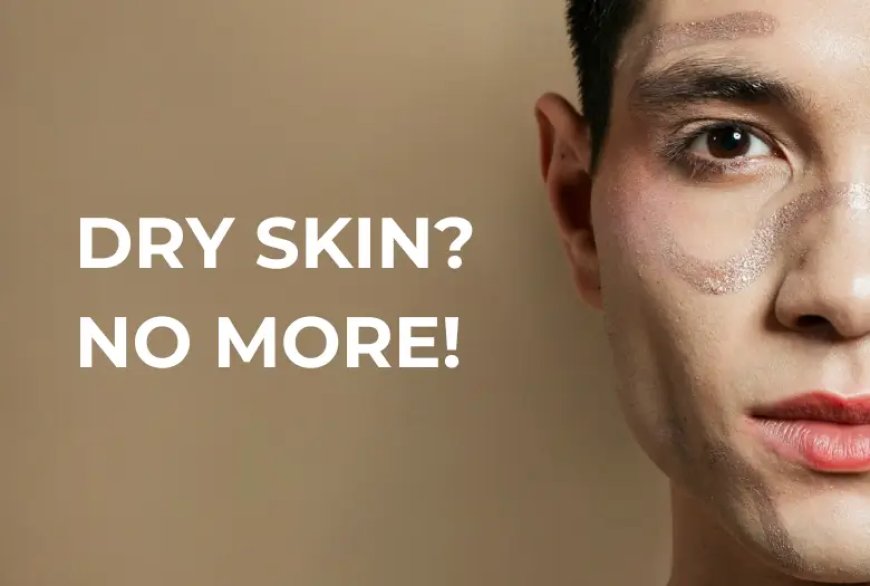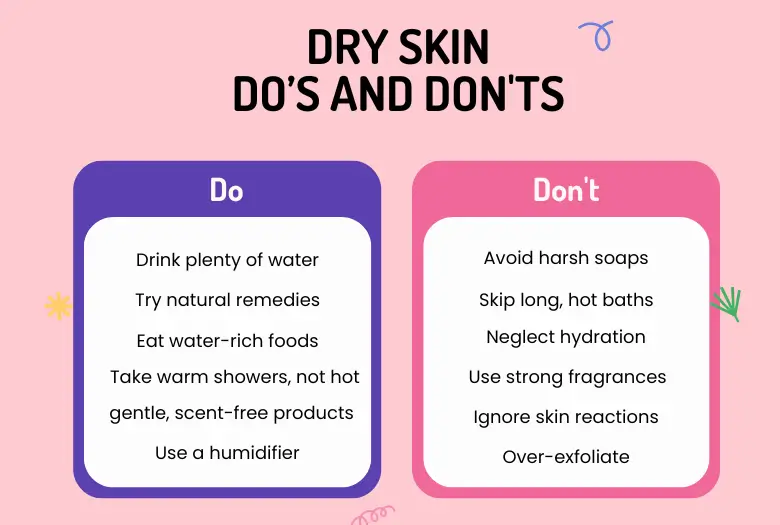How to Treat Dry Skin Without Moisturizer: 5 Simple At-Home Remedies!
If you have dry skin, you may notice some discomfort like tightness, itching, or flakiness. That can be irritating, don’t you think? Feeling a bit down is normal when your skin isn’t at its best. But don’t worry! There are many ways to help you feel more comfortable and boost your confidence. You can use […]

If you have dry skin, you may notice some discomfort like tightness, itching, or flakiness. That can be irritating, don’t you think? Feeling a bit down is normal when your skin isn’t at its best. But don’t worry! There are many ways to help you feel more comfortable and boost your confidence.
You can use natural remedies and a simple skincare routine to add moisture, ease irritation, and improve your skin. Below are the best ways to treat dry skin without moisturizers, including home remedies and skincare tips. These solutions will help keep your skin soft, smooth, and hydrated. Let’s dive in!
What Is Dry Skin?
Dry skin, also known as xeroderma, is a condition where the skin feels rough, flaky or itchy. It happens when your skin does not have enough moisture to keep it soft and smooth. Dry skin can appear on the scalp, hands, arms, legs, knuckles, and sometimes the thighs.
What Causes Dry Skin?
There are many reasons why your skin becomes dry. Sometimes, it’s due to cold weather or dry air, which makes the skin lose moisture more quickly. Environmental factors, like air pollution, can also strip away your skin’s natural moisture.
Sometimes, it might be due to changes in the seasons, hot showers, or harsh soaps. They strip away the natural oils that your skin needs to stay healthy. A lack of essential nutrients, like vitamin A, vitamin D, and zinc, can also lead to dry skin.
Dry skin isn’t just a problem for your appearance; it can also affect how you feel every day. Dry skin can hurt your confidence, especially if it shows on your face, arms, or hands.
Signs That You Have Dry Skin
Dry skin shows clear signs. If you notice these symptoms, you likely have dry skin.
- Flakes and rough texture: Your skin might look flaky and feel rough.
- Cracks in the skin: Small cracks or splits in your skin may become noticeable.
- Itching: Dry skin often causes an irritating itch that is hard to ignore.
- Painful Skin: Soreness or tenderness in your skin can be a sign of dryness.
- Wrinkled and rough appearance: Your skin might look wrinkled and feel rough to the touch.
- Skin infections: Dry skin is more prone to infections. It requires extra care.
- Peeling skin: Your skin may peel, as if shedding an old layer.
If you see these symptoms, start using more moisturizer and caring for your skin better. Next, let’s look at some effective DIY remedies for dry skin.
How to Treat Dry Skin Without Moisturizer: 5 Simple Home Remedies!
Is your dry skin making you uncomfortable? Don’t worry! Natural remedies can restore moisture and soothe your skin. Here are five easy home remedies you can try at home.
1. Honey and Olive Oil Mask
Honey is a natural humectant that helps keep moisture in the skin. While olive oil is rich in antioxidants and vitamins, which nourish and hydrate the skin.
Ingredients You Will Need:
- 1 tablespoon of honey
- 1 tablespoon of olive oil
Instructions:
- Mix the honey and olive oil in a small bowl until well combined.
- Apply the mixture to your face or affected areas.
- Leave it on for 15 to 20 minutes.
- Rinse off with warm water and pat dry with a soft towel.
Frequency:
- Use this mask 2-3 times a week.
Benefits:
- This face mask deeply hydrates and locks in moisture.
- It soothes and nourishes the skin, leaving it soft and smooth.
2. Coconut Oil Treatment
Coconut oil moisturizes dry skin well. It’s packed with fatty acids that restore the skin’s natural oils.
Ingredients You Will Need:
- Two tablespoons of coconut oil
Instructions:
- Melt the coconut oil if it’s solid to create a liquid state.
- Gently massage the oil into your skin, focusing on dry areas.
- Leave it on for at least 30 minutes or overnight for the best results.
- Wipe off any excess with a soft cloth if necessary.
Frequency:
- Apply daily, especially before bedtime.
Benefits:
- It provides intense hydration and helps to repair the skin barrier.
- It has anti-inflammatory and antimicrobial properties.
3. Aloe Vera Gel
According to PubMed research in 2003, aloe vera gel may help relieve dry skin and improve skin integrity. It also has anti-inflammatory benefits that can calm irritation.
Ingredients You Will Need:
- Fresh aloe vera leaf (or pure aloe vera gel)
Instructions:
- If using a fresh leaf, cut it open and scoop out the gel.
- Place the gel on your skin.
- Leave it on for 10 to 15 minutes. Then, rinse off with cool water and pat dry.
Frequency:
- Apply the gel before sleep and leave it on overnight. Doing this regularly benefits your skin.
Benefits:
- It hydrates and soothes dry and irritated skin.
- It also helps to reduce redness and inflammation.
4. Oatmeal Bath
Oatmeal soothes the skin. It relieves itching and dryness by forming a protective barrier.
Ingredients You Will Need:
- One to two cups of oatmeal, ground into a fine powder.
Instructions:
- Add the colloidal oatmeal to a warm bath.
- Stir well to ensure it is evenly distributed.
- Soak in the bath for 15 to 20 minutes. Now, gently pat your skin dry with a towel after bathing.
Frequency:
- Use it twice a week.
Benefits:
- It provides relief from itching and irritation.
- It also helps to lock in moisture and protect the skin.
5. Avocado and Banana Mask
Avocado is rich in healthy fats and vitamins, while bananas are full of potassium and vitamins that help nourish and hydrate the skin.
Ingredients You Will Need:
- 1 ripe avocado
- 1 ripe banana
Instructions:
- Simple mash the avocado and banana together until smooth.
- Then apply the mixture to your face or other dry areas.
- Leave it on for 15 to 20 minutes. Now, rinse off with warm water and pat dry.
Frequency:
- Use once a week.
Benefits:
- It provides deep hydration and nourishment.
- It also leaves the skin feeling soft and rejuvenated.
Bonus Tip: Hydrating Foods
To keep your skin hydrated, try adding more water-rich foods to your diet. Here are some ways these delicious foods can support your skin health:
- Cucumbers: Did you know that cucumbers consist of about 95% water? They’re a great way to keep your skin hydrated and help your body get rid of toxins.
- Oranges: Oranges are a fantastic source of vitamin C and water. They help your body make collagen and keep your skin well-hydrated. Adding them to your meals can be a simple way to boost your health.
- Strawberries: Loaded with antioxidants and water, strawberries are good for your skin because they help fight dryness and soothe inflammation.
Best Skincare Regimen for Dry Skin
Noticing dry skin? I have a simple skincare routine that can help keep your skin soft and hydrated. Give it a try!
- Hydrating Cleanser (Morning and Night): Use a hydrating cleanser every morning and night. It gently cleans your skin while keeping its natural oils.
- Toner (Morning and Night): After cleansing, apply toner morning and night. It restores balance and improves the absorption of other products.
- Hydrating Serum (Morning and Night): Apply the hydrating serum twice daily after tone. It adds moisture and boosts skin elasticity.
- Facial Oil (Morning and Night): Facial oil locks in moisture and adds glow. Use it twice daily to keep your skin nourished.
- Sunscreen (Morning): Appy sunscreen every morning. It shields your skin from UV (ultraviolet) rays, preventing dryness and early aging.

When to See a Dermatologist
Consult a dermatologist if you’ve tried these remedies and still feel very dry or uncomfortable. They can help. Here are some situations when you should think about making an appointment:
- If your skin feels very painful or uncomfortable.
- If it is cracking or bleeding.
- If your home remedies aren’t working.
- If you notice red patches or a rash.
- If it’s getting infected.
- If it is affecting your daily life.
Remember, it’s always okay to ask for help when you’re unsure about your skin. Dermatologists are there to support you, so don’t hesitate to reach out if you need it.
Final Thoughts on How to Treat Dry Skin Without Moisturizer
I understand dry skin can be frustrating. But you can fix it without using moisturizer or lotion. Natural home remedies, like honey masks, aloe vera, and coconut oil, can hydrate and soothe.
Also, drinking plenty of water and avoiding long, hot showers can help. Using gentle, fragrance-free products can help, too. Your skin is unique, just like you! Pay attention to how your skin reacts to treatments
If these methods don’t meet your needs, please contact a certified dermatologist. They can offer personalized advice just for you. By following these steps, you can enjoy healthy and comfortable skin with ease!
FAQs
Q. Can dry skin heal without moisturizer?
Yes, dry skin can improve without regular moisturizers. Home remedies like honey, aloe vera, and coconut oil work well. Remember, everyone’s skin is unique, so please try different options to see what suits you best.
Q. Is it okay if I don’t use moisturizer?
Yeah, it’s completely okay not to use standard moisturizers. Natural remedies or good habits can also work. Just watch your skin and adjust as needed.
Q. Can I use Vaseline as a moisturizer?
Yes, you can! Vaseline (petroleum jelly) is a good moisturizer. It locks in moisture, especially for very dry skin. However, its greasiness might not suit everyone.
Q. How to remove internal dryness from the body?
To remove internal dryness, drink plenty of water. Also, eat hydrating foods like cucumbers, oranges, and strawberries. Additionally, limit caffeine and alcohol to prevent dehydration.
Q. Are these remedies safe for my skin?
Most natural remedies, such as honey and aloe vera, are generally safe. However, test a small amount first to check for reactions. If you’re uncertain, consult a dermatologist.
Medical Disclaimer: This article is intended for educational purposes only and should not be considered medical advice. We aim to provide accurate information. However, it is essential to consult a qualified healthcare professional before initiating or modifying any treatments.
Sources:
For more detailed information and studies on dry skin, you can refer to the following resources:
Image by freepik


























































